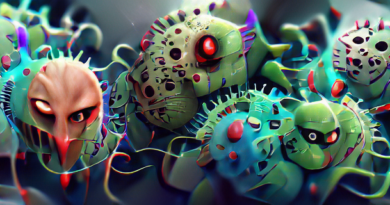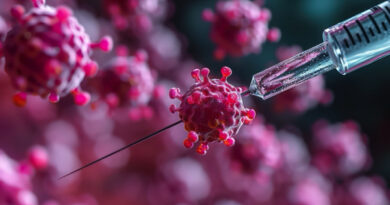Health Ranger posts new microscopy photos of covid swabs, covid masks and mysterious red and blue fibers

What follows is a series of microscopy photos of covid swabs (a synthetic swab, then a cotton swab), a covid mask and some zoomed-in photos of mysterious red and blue fibers found in the masks.
The magnification range for these photos is 50X to 200X. Most were taken with white light, but several (as indicated) were taken with UV light.
The images shown here are 600 pixels wide. We have higher resolution images available to researchers and indy media journalists; contact us for those hi-res images.
More microscopy investigations are under way, and new images will be posted as they are finalized.
First, this series shows the carbon fiber layer of a covid mask, illuminated with UV light:


Here’s the same carbon fiber layer under white light, shown at different magnifications:



Notice the adhesive film between carbon fiber strands:

Some areas of the carbon fiber strands appear to surround “egg sac” looking objects, but they might simply be bump textures in the white fiber layer:


Here’s a look at the outer layer of a China-made covid mask. This first photo is shown at around 50X.


Here’s 200X, which reveals huge gaps in the fibers, revealing such masks to be essentially pointless when it comes to stopping airborne virus particles:

Many masks appear to contain mysterious red and blue fibers. Here’s one such fiber in a China-made mask:

This next photo shows a Taiwan-made mask with a far more dense fiber weave, meaning it would be more effective against airborne particles:

Here’s a closer look at some of the blue and red fibers found across all the masks we examined. We do not know why these fibers are there, and we are not claiming them to be Morgellon’s fibers. Their origin and purpose is entirely unknown at this point:





Some of the mysterious fibers are black or gray and appear to be shaped like small hooks or fragments of hooks:



In order to reveal more contrast in the images, I stained the masks with iodine (a common technique in microbiology). This helps to show the mysterious fibers in more detail:



Here’s a cotton fiber nasal swab used for covid testing:


A closeup (200X) of the cotton swab:

This is a UV-illuminated snapshot of the synthetic fibers found on a covid swab, stained with iodine:

We took a time-lapse photo series and aggregated the photos to reveal strange sparkles coming off the synthetic swab strands when exposed to UV light:


This is taken at about 200X magnification. Notice the translucent synthetic fibers on the right. These are the fibers whose tips are swabbing your upper nasal passages during a covid test:

Here’s a look at the iodine-stained swab under normal white light:

Zoomed in a little more:

These may look like “worms” but they appear to be synthetic fibers. We aren’t yet sure about the topography of the tips yet, but will examine those more closely in future microscopy sessions:

Here’s what a covid test swab (synthetic) looks like under white light:





Pay close attention to this last image which is a digital zoom of a bluish fiber shown above. This is taken from a China-made covid mask. First, notice that one fiber which crosses horizontally in front of the fiber is nearly transparent and refractive (where it crosses the blue fiber). Is this a natural fiber, or something synthetic?
But more importantly, look at the spikes coming off the “head” of the strange fiber on the lower left of this image:

That “head” appears to be some sort of spike structure or gripper structure, and we don’t normally see this sort of structure from natural fibers. This raises real questions about what these fibers are, where they came from, and what their purpose might be in covid masks.
Many people experience difficulty breathing while wearing covid masks. Media reports have already warned that graphene fibers have been found in some masks, contaminating the respiratory pathways of people who wear them. What other structures or fibers might be deliberately added to these masks?
We don’t know all the answers yet, but we are looking closely to see what else we find.
Feel free to use these photos. Please credit NaturalNews.com. We are working hard in the lab to acquire more photos and videos that are relevant to all this. Thank you for your support as we conduct more laboratory investigations in the interest of public health.
*** This article has been archived for your research. The original version from Natural News can be found here ***


